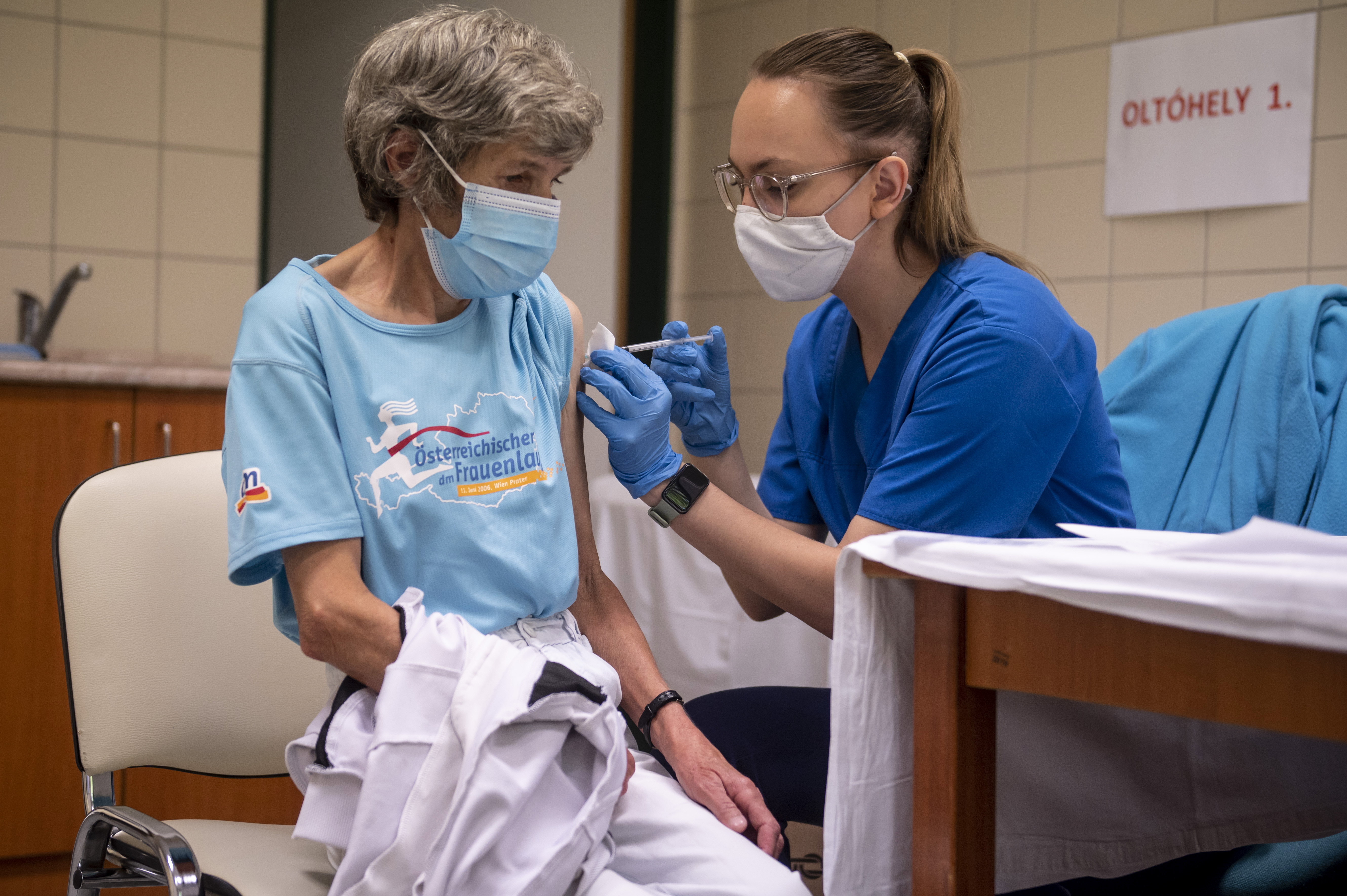Orbán: No Restrictions Until ‘Last Minute Possible’

A woman is vaccinated with a third, booster dose of the German-American Pfizer-BioNTech coronavirus vaccine, Comirnaty, at the Ferenc Markhot Hospital in Eger on October 5, 2021. Pfizer Gyógyszerkereskedelmi says total deliveries of the Comirnaty vaccine to Hungary are now to close to 9.5 million doses.
Photo by Péter Komka / MTI.
The Hungarian Parliament voted on September 27 to extend the effect of government decrees issued by the government under the state of emergency declared because of the coronavirus crisis, according to state news agency MTI.
With a vote of 112 for, 25 against, and no abstentions, MPs decided to extend the effect of the legal provisions until January 1, 2022. The regulations had been set to expire 15 days after the start of the fall session of Parliament, on October 5. The law also says that the government could end the state of emergency early, before its cancelation deadline.
The decision comes as coronavirus concentrations in wastewater continue to rise, the National Center for Public Health (NNK) said on October 4, according to its latest data. The public health authority added that the samples show an upward trend nationwide.
Despite this, Prime Minister Viktor Orbán said he would argue against introducing restrictions during any potential fourth wave of the pandemic “until the last minute possible” in an interview on Kossuth Rádió on September 24. He added that nothing should be introduced that made anybody feel they were being treated unfairly.
“It wouldn’t be right, when two-thirds of the country is inoculated, six million people, to restrict them because a minority in the country doesn’t want to get inoculated,” he said.
“If there are any kind of restrictions, I will propose a return to using immunity certificates which differentiate between those who took the responsibility of getting inoculated and those who didn’t take that responsibility,” Orbán said.
Herd Immunity?
According to virologist Miklós Rusvai, the Hungarian population will be protected against the coronavirus within a year and a half, either through vaccination or re-infection. The pathogen will still be present, but everyone will have partial immunity from then on, and the coronavirus will not cause a problem, he said.
Globally, Rusvai predicted that overcoming the epidemic could take two to three years. However, the virologist also told the M1 TV news channel on September 26 that as many as 400,000 people over the age of 60 had still not been vaccinated in Hungary, even though those vaccinated against the coronavirus are much less likely to get sick and those that do have much milder symptoms.
Deliveries of the COVID vaccine developed by Pfizer and BioNTech continue to be delivered to Hungary, with a shipment of 170,000 doses on September 23, 420,000 on September 28, and 150,000 on October 5. Pfizer Gyógyszerkereskedelmi said the latest batch raises total deliveries of the Comirnaty vaccine to Hungary to close to 9.5 million doses.
At the general assembly of the World Intellectual Property Organization (WIPO) in Geneva on October 4, Minister of Foreign Affairs and Trade Péter Szijjártó acknowledged a push by some for a patent waiver on COVID vaccines, but said the Hungarian government believes such a move “could discourage the continued work of researchers in future.”
Meanwhile, Semmelweis University became the first institution in the EU to examine a patient as part of an international clinical trial program for testing oral medicine against COVID-19, according to state news agency MTI.
Rector Béla Merkely said the medical school would offer COVID patients that qualify and come to the university’s facilities a chance to participate in the trial. The program is being carried out in 400 research centers, including six in Hungary, to verify if oral antiviral medicine can help reduce the duration or severity of COVID-19.
This article was first published in the Budapest Business Journal print issue of October 8, 2021.
SUPPORT THE BUDAPEST BUSINESS JOURNAL
Producing journalism that is worthy of the name is a costly business. For 27 years, the publishers, editors and reporters of the Budapest Business Journal have striven to bring you business news that works, information that you can trust, that is factual, accurate and presented without fear or favor.
Newspaper organizations across the globe have struggled to find a business model that allows them to continue to excel, without compromising their ability to perform. Most recently, some have experimented with the idea of involving their most important stakeholders, their readers.
We would like to offer that same opportunity to our readers. We would like to invite you to help us deliver the quality business journalism you require. Hit our Support the BBJ button and you can choose the how much and how often you send us your contributions.








